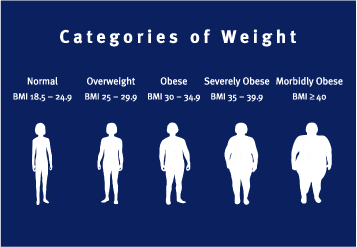
The BMI, or body mass index, is important because your chances of having a longer and healthier life are better if you have a healthy BMI, according to "Essentials for Health and Wellness." You have a higher risk of the following problems if your BMI is 25 or above--accidents, arthritis, breathing difficulties, diabetes, gallbladder disease, heart disease, high blood pressure and varicose veins.
BMI Defined
The BMI is your weight divided by your height squared (W/HH). Your weight is in kilograms and your height is in meters because most of the world's nations use the metric system. One kilogram equals 2.2 pounds, and one meter equals 39.4 inches. You are at a normal or healthy weight if you are an adult and your BMI is between 18.5 and 24.9, underweight if your BMI is below 18.5, overweight if your BMI is between 25 and 29.9 and obese if your BMI is 30 and above.
Accepted by Doctors
The Metropolitan Life Insurance Co.'s weight-for-height tables and other body fat measurements also project whether you are at risk for diseases. However, the BMI became important to many doctors after a 1972 study showed it was the "best predictor" of weight-for-height tables, according to "Beyond BMI," an article in the July 20, 2009, issue of "Slate" magazine. Doctors advising patients can also use the BMI without subjectively assessing body frames, a critical component of Metropolitan's tables.
Saves Money
The BMI is also important because it saves doctors a lot of money. Five other methods accurately measure obesity, but they are expensive, require highly trained professionals and/or are "not always readily available," the Centers for Disease Control and Prevention (CDC) reports. The CDC identifies these methods as biolelectrical impedance, dual-energy X-ray absorptiometry, isotope dilution, skinfold thickness with calipers and underwater weighing.
Assesses Risk
The BMI's accuracy at assessing your increased risk of getting serious diseases makes it very important, according to the National Institutes of Health and the CDC. The National Heart, Lung and Blood Institute report that you are at increased risk for cardiovascular disease, hypertension and Type 2 diabetes if your BMI is between 25 and 29.9. Your risk of getting these three diseases is "high" if your BMI is between 30 and 24.9, "very high" if your BMI is 35 to 39.9 and "extremely high" if your BMI is 40 and above.
Predicts Other Diseases
High BMIs project increased risk of high bad cholesterol levels, low good cholesterol levels and high triglycerides levels so knowing your BMI is important long before you are at risk of more serious cardiovascular diseases, the CDC reports. High BMIs also project increased risk of breast cancer, colon cancer, endometrial cancer, gallbladder disease, osteoarthritis, respiratory problems, sleep apnea and strokes.
Helps Young People
The BMI's importance is emphasized by its accuracy at measuring children's body fat, the CDC reports. You can find your children's BMI by consulting the CDC's website, which tells you whether they are underweight (less than fifth percentile compared to kids who are the same age, height and gender), healthy weight (fifth through less than 85th percentile), overweight (85th through less than 95th percentile) and obese (95th percentile and above).
References
- "Essentials for Health and Wellness"; Gordon Edlin, Eric Golanty, Kelli McCormack Brown; 2000
- "Slate" magazine; Beyond BMI; Jeremy Singer-Vine; July, 20, 2009
- Centers for Disease Control and Prevention: About BMI for Adults
- National Heart, Lung and Blood Institute: Classification of Overweight and Obesity by BMI
Read more: http://www.livestrong.com/article/125378-bmi-important/#ixzz1wPHM64DR
No comments:
Post a Comment